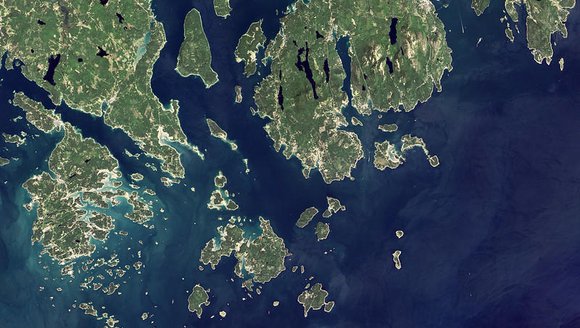Understanding Climate Impacts on the Maine Coastal Fish and Invertebrate Community
What can we learn about the Gulf of Maine by synthesizing data from the region's trawl surveys?
The Gulf of Maine, and the important fishery resources it supports, is experiencing natural and anthropogenic changes in climate. In fact, the Gulf of Maine is warming more rapidly than almost any body of water on the planet. The rapid pace of warming underscores the need to understand how our state’s marine resources are changing, and how continued warming will impact our expectations in the region. The goal of this study is to synthesize data collected through the ME-NH Inshore Trawl Survey, and place it in the context of other surveys in the region, to understand how climate change and other drivers are impacting key fish and invertebrate communities in coastal Maine.
Project Objectives:
- Analyze changes in biodiversity in space and time and evaluate associations with environmental factors and fishing.
- Identify species groups and assess changes in habitat suitability of functional groups and communities in space and time.
- Analyze joint distributions of key predator-prey species within the community, with a particular focus on lobster and cod.
- Evaluate how ecosystem changes align with shifts in diversity and composition of fishery landings over time in ports along Maine’s coastline.
Because of the rapid pace of warming in Maine waters, we need to better understand what that means for our state’s marine resources now, and into the future. The goal of this study is to synthesize data collected through the Maine-New Hampshire Inshore Trawl Survey, and place it in the context of other surveys in the region, like the Northeast Fisheries Science Center Multispecies Bottom Trawl Survey and the Massachusetts Inshore Trawl Survey. Piecing together the temperature and salinity data from these different surveys will help us understand how climate change and other drivers are impacting key fish and invertebrate communities in coastal Maine.
We will also use biodiversity data, including species occurrence and abundance data, from these surveys to characterize community composition and diversity in Maine's waters using several metrics, including species richness, evenness, and diversity, as well as taxonomic diversity and distinctness. Identifying species groups and functional groups, as well as characterizing community compositions is a crucial component of this project. These biological-ecosystem relationships are of interest for understanding how community patterns and habitat suitability are influenced by temperature, salinity, fishing, depth, and geography.
Additionally, we will use joint species distribution models, to analyze joint distributions of key predator-prey species within the community, with a particular focus on lobster and cod.
The rapid pace of warming, and the impact that has on Maine's marine resources, is one piece of the puzzle. So, to paint a more detailed picture of the status of our state's marine resources, we will also include fisheries data in our analysis, such as commercial landings by species using NOAA’s Commercial Fishery Dealer Electronic Reporting System (CFDERS) database. Evaluating the joint impact of climate and fishing on Maine’s marine communities will demonstrate the potential value of an ecosystem-based approach to fishery management. For example, if landings patterns do not align with the ecological patterns we identify in the survey synthesis, that might suggest that drivers other than species availability exert stronger influences on fisheries. It could be that management decisions and associated regulations or the high economic value for a particular species can both drive specialization on certain species. Fishermen in Maine may choose to target a smaller subset of species due to a variety of influences, including declines in abundance of traditional groundfish, increases in abundance of high-value species (i.e., lobster), or license or permit restrictions (Stoll et al. 2016). While this specialization may be rational under current regulatory and economic conditions, it may make fishermen and fishing communities more vulnerable to future changes or unexpected shocks (e.g., ocean heat waves, Mills et al. 2013).
This project will produce new knowledge from existing data that can be used to support decisions in resource management, and we will summarize our study results into a final report, including at least two publications. Our findings will be accessible and shared with stakeholders.
This research aligns with the 'Prepare for a changing climate' focus area in Maine Sea Grant's 2018-2021 Strategic Plan, and will contribute to their objective to 'Support community, state, and regional efforts to understand, communicate about, and respond to climate-related changes in the marine and coastal environment, including increased water temperature.'
Project Team
Project Sponsor
This research is made possible through the generous support of Maine Sea Grant.
Read More
-
![Gulf of Maine, Explained: Trawling]()
Gulf of Maine, Explained: Trawling
While many of us enjoy fresh local seafood, we don’t often get to see how that fish is harvested. Trawling is one of the most …
Gulf of Maine, Explained
-
![Gulf of Maine, Explained: The Warming Gulf of Maine]()
Gulf of Maine, Explained: The Warming Gulf of Maine
What was once a startling observation among our team of ecosystem modelers is now common knowledge: over the course of a decade, the Gulf of …
Gulf of Maine, Explained
-
![Gulf of Maine, Explained: The Warming Gulf of Maine]()
Gulf of Maine, Explained: The Warming Gulf of Maine
What was once a startling observation among our team of ecosystem modelers is now common knowledge: over the course of a decade, the Gulf of …
Gulf of Maine, Explained
-
![Climate Action: New State Goals to Prevent & Prepare for Climate Change]()
Climate Action: New State Goals to Prevent & Prepare for Climate Change
Press Clips



